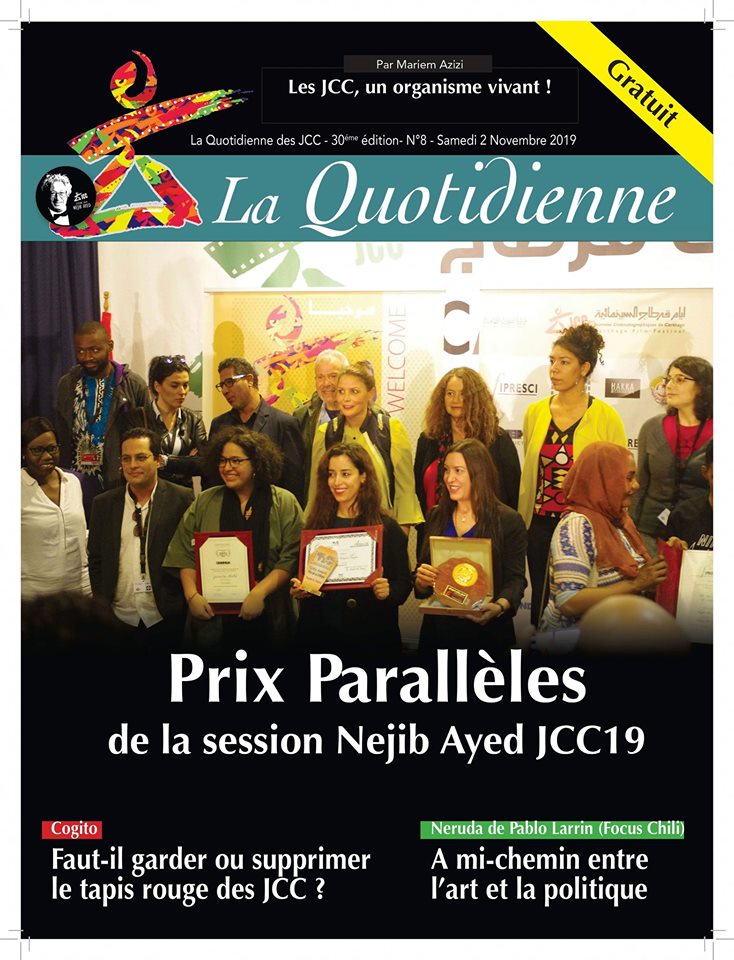Saturday November 2 ended The Nejib Ayed session of Carthage Cinematographic Days (JCC) Through a closing ceremony which took place at the Cité de la Culture de Tunis. This ceremony had been preceded by the passage of the guests on a red carpet, which some had called to delete.
Indeed, as every year, several people criticized these opening and fence ceremonies of the JCCs and the red carpet that accompanies them. And as every year, during the first days of the festival, we only talked about dresses, necklines and breasts or thighs that some people thought they saw … Of course with all the remarks, insults, judgments and convictions that can be imagined when it comes to the body of women.
On his Facebook account, director Hichem Ben Ammar had even claimed the abolition of this red carpet for the closing ceremony of this JCC edition because according to him, he prejudice to the festival by dismissing him from his fundamentals and his militant mission. He went so far as to qualify certain guests as ” Soubrettes, hairdressers, secretaries and other dreamers “Wanting” Speaking by imposing their clothing delirium, their Botox, their cellulite, their ignorance, their vulgarity, their indiscipline which manifests itself in our work. ».
It is true that some take advantage of the red carpet to be talked about, create the buzz and make the front page for a few days, various newspapers and magazines. It’s really regrettable. Unfortunately, this happens everywhere, especially at the time of social networks. But is that a reason to remove red carpets?
No, I don’t think so.
We can obviously criticize the management of invitations to ceremonies, ask that we reduce the number of non -professional guests in cinema as much as possible, or that the invitations are nominative so that they cannot be sold or even sold, but the red carpet and the festive side of the opening and fence ceremonies of festivals.
It is said that JCCs are a militant festival. He is. But activist does not mean dreary and sad. On the contrary, this festival must celebrate life and joy.
Seeing all these ladies in their cheerful and shimmering dresses (it is true, a few rare times not elegant), gives color to color, unlike sad and dreamers that we see more and more in the Tunisian streets. This too is activism somewhere. Another way to fight, to fight against ambient greyness and crawling conservatism.
In addition, the red carpet is an opportunity for the public to meet in the flesh, the actors and actresses he sees in the cinema and on TV. He can finally, once a year, approach them, or even sometimes speak to them and even get pictures with them. Why deprive it? Moreover, for this reason, it might be desirable for the ceremonies to be organized again at the Colosseum to allow the public to see his idols closely during the journey between the Africa hotel and the cinema, as was the case for example in 2017.
A festival is also a moment of rejoicing for the public. It allows her to get out of his daily routine and take part in the big party that are the JCC. In this regard, the red carpet is complementary to all the animation which takes place on avenue Habib Bourguiba during the festival, with shows, concerts and screenings of film. Giving joy to people, everyone, not just a few privileged, is also an militant aspect of the festival.
Which confirms the producer Habib Attia, who said: ” We need this party, we need to decompress once a year and celebrate the cinema. I am against extremism, and asking the abolition of the red carpet is extremism ».
The public tries to see the artists who parade on the red carpet
After French producer Daniel Ziskind : ” A festival needs a red carpet. Already out of respect for the teams of films, actors, technicians and directors, who have spent two to three years, even five years of their lives to release a film. Prepare and be beautiful for this special evening in a festival is very important for them. The red carpet is a plus, a way of respecting the film teams and allowing them to be proud of them. ” In addition, for him, “The films selected at festivals are all militant films. What matters most for a festival is the quality and subject of these films. That there are people who do not see the films, but come on the red carpet just to be photographed and take the opportunity to advertise themselves on the back of the festival, that is part of the show business, and it does not matter, since anyway, the buzz they create also benefits at the festival. I am to keep the red carpets. For competitions is important, and in the end, what we remember from the festival is the films we see there ».
While in Tunisia, some would like to remove the red carpet, other festivals on the contrary, having understood the role of promoting the films they fulfill, are multiplying them. In 2018 for example, the Cairo International Film Festival had decided to make the daily red carpet. Every evening, the spectators came very numerous to see the programmed films, attracted by the presence of stars and actors. The experience having been conclusive, it was decided that for 2019, there would be two red carpets per evening, as in Cannes elsewhere, where each evening, at 7:30 p.m. and 10:30 p.m., the teams in competition in competition are present on the red carpet, are taken in photos and are interviewed by journalists and the various media, TV and radios, which contributes largely to the promotion of the film and the festival in the same time.
For the Lebanese film critic Hauvick Habéchian, ” The red carpet does not prevent activism. In Cannes for example, we do both. Next to the red carpet, you can find films that no one will see later in the cinemas, which will in fact be distributed because they are really very difficult, not commercial films, or which sometimes last three or even four hours … The red carpet allows the public to see the actors, the directors … I think that is a whole. I have been covering the JCC for years, and there has always been a red carpet, whatever I do not know if it existed or not since the first editions ». For him, the problem is elsewhere: ” It seems to me that for several festivals, like that of El Gouna for example, and perhaps even the JCC, there is a problem with the press. I believe that around 10% only of journalists who cover these festivals are interested and write articles on films. The others will do the policy of ‘The public wants that ‘and will above all be interested in the event aspect. This sometimes gives a distorted image of the very nature of the festival. On the other hand which really bothers me in our countries concerning the red carpets, these are moral judgments, for example when some allow themselves to say that these are festIVALS DE ‘Putes’. I am categorically against ».
Indeed, in our Arab-Muslim countries, there is a problem with a certain press, which not only lacks cinematographic culture, but also seeks the buzz by publishing articles and photos on the dress of guests, which sells and increase the number of clicks. Especially today, in this increasingly misogynistic, hypocritical and bigote atmosphere which makes the slightest neckline gives rise to hundreds of sharing and comments … Rather than wanting to remove the red carpet, it might be more judicious to think of a better formation of these various journalists and critics.

And then, as Ms. Chiraz Laatiri, director of the National Cinema Center and Image, said so well, “ The JCCs are not these dresses, but a whole program established by a team that has worked a whole year, to select beautiful films, organize interesting seminars…. This is what is important and that is what you need to focus on. The JCCs are much larger and deeper, I invite you not to focus on these superficial aspects and consult the real content of the festival on its Facebook page: projections, panels, master class, Carthage Pro, Carthage Talks, Carthage Digital, Ciné avenue, Focus, JCC in prisons … All this is the program of fire Nejib Ayed. I assure you that his team worked hard to insure and implement it ».
And indeed, it is the most important. The JCCs have not lost their militant aspect. On the contrary, especially for this new Nejib Ayed session, the selection of films that was very beautiful and of high quality.
Rather than calling to delete the red carpet, why not try to make the most of it for everyone, filmmakers, moviegoers and spectators?
Neila Driss.
* A shorter version of this article was published on number 8 of the bulletin The Daily JCC of November 2, 2019.










